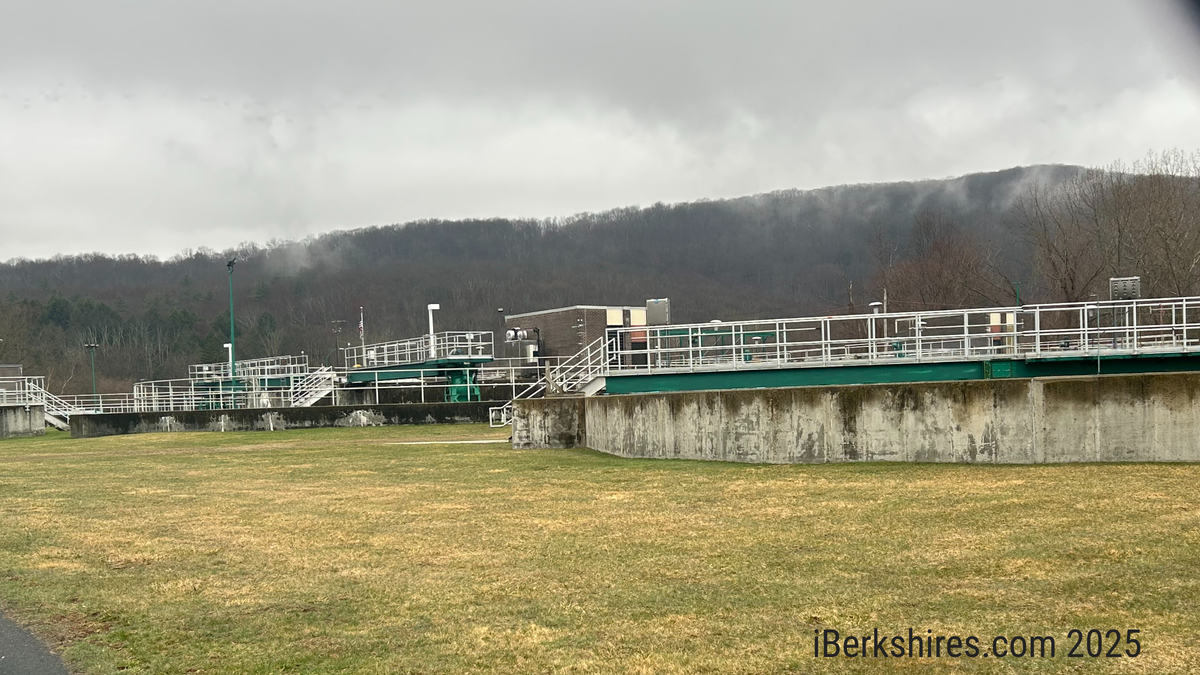
Williamstown Con Comm Renews Permit on Land Eyed for Housing
 Williamstown Rural Lands Foundation Executive Director Leslie Reed-Evans discusses a map outlining town land with conservation restrictions at Thursday's meeting of the Conservation Commission. |
The farmer who works the land said he is aware that the property is among those being considered for development for affordable housing. And he plans to be part of the discussion as that consideration continues.
"I think it's been going on for decades," Kim Wells said of talk about developing the land farmed by George Lowry in the first part of the 20th century and purchased by the town in 1956.
"It's certainly nothing new. I realize that having a lease on the property doesn't mean houses can't be built on it."
Wells cuts hay on the Lowry parcel to feed his beef cattle at East Mountain Farm on Henderson Road. The particularly fertile land just south of Main Street (Route 2) has helped him expand his business of locally raised and sold beef.
"I would not have a beef operation if I didn't have the hay," Wells said. "There's precious little farm land like this in Williamstown."
Coincidental with Wells' appearance before the panel, the Conservation Commission received a letter from Catherine Yamamoto, the chairman of the town's Affordable Housing Committee. In it, she apprised the commission of the status of the Affordable Housing Committee's efforts to find suitable town-owned land to develop to address Williamstown's affordable housing needs and her committee's intention to explore the feasability of developing either the Lowry property or a portion of the 139-acre Burbank property, between Stratton and Luce roads.
Van Ellet, who serves on both Con Comm and Affordable Housing, put on his "Affordable Housing hat" and explained the letter in place of Yamamoto, who was unable to attend Thursday's meeting.
"What we've found so far the probability of moving on currently held public land is going to be expensive or take a long time to complete," Ellet said. "We want to explore the history [of Lowry and Burbank], the reasons why they were taken [by the town] in the first place and whether there are pieces we could use."
Affordable Housing has identified four town-owned parcels as potential sites for affordable housing. In addition to the Burbank and Lowry properties, each of which is being farmed, the committee is looking at the former PhoTech mill site on Cole Avenue and the former town garage site on Water Street.
Both PhoTech and the town garage site have contaminated soil issues, and together they might not be large enough to meet the town's entire affordable housing needs — needs that were exacerbated last year by Tropical Storm Irene's impact on the Spruces Mobile Home park.
Conservation Commission member Philip McKnight praised the Affordable Housing Committe and recently constituted Affordable Housing Trust for addressing the town's needs, but cautioned that his committee would need the development process to be further along before it would consider releasing either the Lowry or Burbank properties from conservation status.
"Until the commission receives satisfactory information that funding is in place, it's a moot issue," McKnight said. "Lowry and Burbank are not going to be released."
 |
 |
| Kim Wells, left, and Dr. Eric White appeared before the commission for different land issues. | |
McKnight — also chairman of the Community Preservation Act Committee — reported that last week he received a letter from Mitchell Properties, the Boston-based developer that owns Cable Mills.
In that Nov. 1 letter, Mitchell Properties' director of development, David Traggorth, told McKnight, "one plan is gaining traction and can allow us to proceed with construction in the late Spring of 2013."
Mitchell Properties plans 61 units in the mill buildings, including 13 units of housing subsidized by funding from the state Department of Housing and Community Development, Traggorth's letter said.
In other business on Thursday night, the commission heard about plans by Dr. Eric White and two other landowners to place a conservation restriction on 19 acres of open fields and 20 acres of forested land on Oblong Road - land that once was owned by novelist Sinclair Lewis and, until it was sold to White, by the Carmelite Fathers, a Roman Catholic order, which operated a retreat there.
"The primary purpose besides open space is agricultural use, and a restriction prevents developing housing on the land," White told the commission.
White said the open fields on the property are hayed by local farmers. He will come back to the commission with more formal plans at a later date.
Tags: affordable housing, agriculture, land conservation,
















